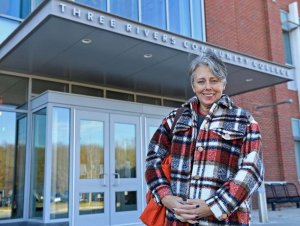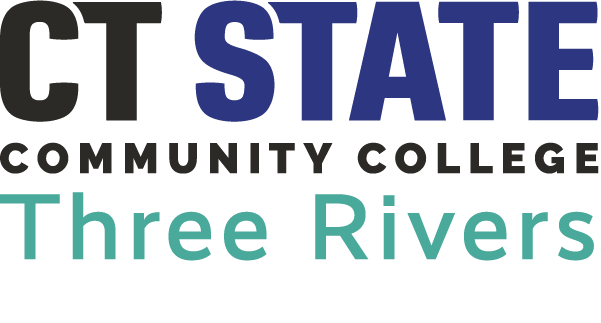In The News | Connecticut community college students uncertain on consolidation plan
Norwich (December 4, 2021) — When Allen Lyon of Norwich wanted a new life, Three Rivers Community College was the most logical step.
He started at the community college at age 27 and, because he had dropped out of high school to help family at a young age, first needed to obtain a GED. Now 30, he graduated from Three Rivers this year with an associate degree in environmental engineering technology, and is going on to study natural resources at the University of Connecticut.
“I never really thought I was capable of going through school, so I always told myself don’t even bother. But as I got a little bit older I was like, ‘Well I don’t want to be in the restaurant service for the rest of my life,'” Lyon said. “That’s what made me go back. Three Rivers made a lot of sense distance-wise because I was in Norwich.”
“Thankfully, it all fell into place,” he said. “It was a good program and a good school, so I’m glad I ended up going.”
While professors have criticized a plan to consolidate the state’s community colleges, and administrators defend the move and the process, students are mostly focused on their futures.

Heather Lussier stands outside Three Rivers Community College Friday, December 3, 2021. (Sean D. Elliot/The Day)
Lyon said it doesn’t seem like Three Rivers or other schools are telling students the ramifications of consolidation.
“In my opinion I don’t think the college itself talks about it enough to its students,” he said. “I think that it’s very based in money, which makes sense. I understand that the state wants to save money where it can, but I think it’s important not to sacrifice the experience or success of the student to save a couple dollars, and I think that’s why it’s not talked about as much. It’s unfortunate because if more students knew what was on the chopping block, more students would be outspoken.”
In conversations with several current and former Three Rivers Community College students, none claimed to be an expert on the consolidation plan. Some said they didn’t know what it was. But everyone was clear on why they were at this community college — be it affordability, convenience or some other reason — and everyone praised Three Rivers.
Professors from different teaching unions, unified under the “Reluctant Warriors” tag, including Diba Khan-Bureau, professor and program coordinator of environmental engineering technology at Three Rivers, view the merger as a threat to academic freedom for professors and students. And the unions feel they’ve been ignored when offering ideas on how to align the curriculums.
Professors believe there’s still hope to defeat the merger, but Connecticut State Colleges and Universities anticipates it will be completed — marked by the launch of Connecticut State Community College — for the fall 2023 semester.
Protests from the teachers’ unions regarding the consolidation and ongoing contract negotiations continue throughout the state. But in late November and early December in Norwich, students were focused on their classes.
Lyon and others, including Jacob Hall of Sprague, 18, highly praised how Three Rivers prepares students for the next step.
Hall, in his first year at Three Rivers, said the college wasn’t his initial choice but he’s content with how it worked out. “Originally I wanted to go to a university, but I’m from an area where I don’t have that much money, so I couldn’t go there, and I always knew this was an option,” he said. “I love it. It’s a lot more work than high school but I think it’s exactly what I needed.”
Of all the students who spoke to The Day, Hall was the one most supportive of the merger.
“Honestly it’s a great idea because, say I do need to transfer for some reason, or I want to transfer for some reason, all my credits would transfer over, and it would just be an easier process in the long run,” he said. “Professors and students haven’t talked about it a ton. They know it’s there, but it’s more of a subconscious thing.”
Olivia Corrente and Tyler Dean, who are both 18 and in their first semester at Three Rivers, went to Norwich Technical High School. Corrente said the PACT program, which allows students to attend Three Rivers and other community colleges for free, is a big reason why she decided to attend the college. Dean also said affordability had something to do with his decision to attend Three Rivers.
Dean is hoping to attend UConn or Eastern Connecticut State University when he’s finished at Three Rivers. Corrente also is hoping to go to a larger school after her two years, to study criminal justice and forensics. She, along with several other students, complimented the professors at the Three Rivers.
While Corrente hadn’t heard about the consolidation, Dean was evenhanded in his assessment.
“I’ve been hearing some word about it lately. I heard that they’re trying to combine all the community colleges into one to make it more of a university style rather than these small, separate community colleges,” he said. “I feel like there’s benefits to both arguments. Having a small college like this is nice because it keeps the class size per teacher ratio down, like 20 kids a class is always nice.”
Vanessa Sotelo, 40, is in her first semester at Three Rivers and studying sociology. She has lived in Gales Ferry the past few years and said she is part of a military family.
“It’s from in part being involved in activism and wanting to do something that hopefully makes a difference in the community,” Sotelo said of why she chose to study at Three Rivers. “I’m very impressed by the teachers and their dedication, they’re so well-prepared and everything.”
Sotelo, too, is looking to transfer to UConn after two years at Three Rivers. As for the consolidation of community colleges, she’s uncertain of its implications.
“Professors have brought it up, have mentioned that it’s happening, and I still don’t feel very familiar with what that means for me,” she said. “All I know is my program is still going to be be here. As far as I know it’s possible certain classes that were available are no longer going to be.”
Connecticut State Colleges and Universities has repeatedly disputed claims about a loss of local and faculty control over curriculums. What will change is that a single institution’s curriculum must be aligned across the new college system. Professors and administrators disagree on what that should look like, and the curriculum remains one of the biggest sticking points in the consolidation process.
Heather Lussier, 54, has been going to Three Rivers for more than a decade. She is an Army veteran who was deployed three times — to Afghanistan, Iraq, Spain and Jordan, among other locations — since she began at Three Rivers.
“I didn’t know what I wanted to do, and I knew I needed something besides the military experience,” she said. “I got my first degree in liberal arts, then I stayed and changed my focus to environmental engineering technologies, which will later bring me into natural resources of the environment up at UConn.”
Lussier lived in Groton, and coming to Three Rivers was for “the convenience factor.”
As for consolidation, she said she doesn’t know much about it but fears it could affect special programs.
Michael Morin, 51, is a former Three Rivers student who is now in the radiologic technology program at Middlesex Community College. He said he went to Three Rivers because he was nearing retirement and looking into secondary careers.
“I looked into cost-effective opportunities that would provide an education for employment in the medical field, one that could be directly applied to a work setting,” he said. “I began taking math and science prerequisites at the new Three Rivers Community College. What was once a good college, was now a great college. The professors are extremely helpful and want you to succeed. It is now a state of the art facility with resources to fit any students’ needs.”
— By Sten Spinella, Day staff writer
The original article can be found here: “Connecticut community college students uncertain on consolidation plan”


